Existing User Log In
New User Registration
Register for a free account to gain full access to the VGChartz Network and join our thriving community.



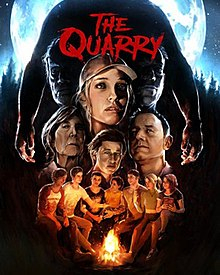

America - Front
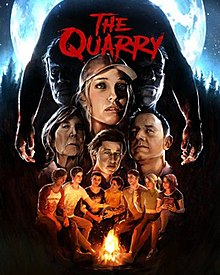

America - Back

Like the cautionary tale Rocky III tells us, it's easy to grow complacent when you're king of the ring. Though it can be amusing running unopposed from time to time, skill wilts without the waters of competition to help it grow. And while The Quarry is by no means bad, its blatant imitation of several sources hinders its ability to establish an identity of its own. Furthermore, the concessions made to streamline its gameplay hold it back further, regressing in an area that needs more appreciation. Newcomers might be enthralled, but Until Dawn veterans will no doubt have a sense of déjà vu – which isn't necessarily a complement.
After a successful season working at an isolated summer camp in the woods, a group of young counselors spend one final night together before going their separate ways in life. Unbeknownst to them, this impromptu party encroaches on the plans of a band of hunters eager to enact an agenda of their own. If any of that sounds familiar to what PS4 owners experienced back in 2015, crack thy cheeks; the Supermassive equation is in full effect, but ends up with a lesser sum than before.
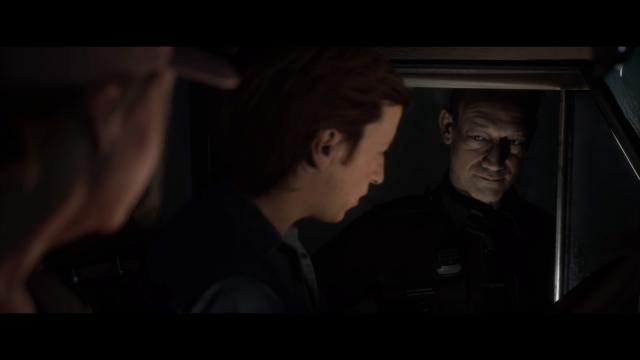
The Quarry's strongest qualities are indisputably its graphics and the performances from the who's who of actors – old and new. I frequently question the relevance of cinema as an art form in our modern age; action scenes in movies were rendered moot by Devil May Cry 3 and Ninja Gaiden circa 2005, whereas storylines and voice acting in video games had already surpassed their cinematic counterparts over half a decade before that. If we can get convincing visual performances out of actors like Lance Henriksen and Grace Zabriskie (who are in their eighties), or transform Ethan Suplee into some hybrid of his past and present selves, merely watching a performance becomes increasingly irrelevant when you could interact with it and become part of the whole. It's going to be a strange day when a digital actor turns in a stronger performance than his flesh-and-blood inspiration, but it's fast approaching and Supermassive is building the bridge to the threshold.
Production value aside, there's much about The Quarry that impresses me in ways that aren't positive. For as much progress as it makes from a technical perspective, there are a number of gameplay regressions aimed to appeal to everyone except the longtime fans. If that wasn't enough, its unabashed mimicry of what came before damages any chance it had to stand on its own.
As per usual, the most significant change comes to the Quick Time Events. Not only is there a noticeable decrease in QTEs in general, almost all of their inputs have moved from the controller's face buttons to the analogue stick. On top of being completely unnecessary, this decision introduces the possibility of input errors via diagonal inputs. Sure, the d-pad can be used to largely circumvent this, but switching the reactive decision making to the non-dominant hand of 90% of the population makes no sense. And for the third game in a row, the two-second advisory warning before each QTE is still ruining their spontaneity (the very reason they exist). Supermassive has been tinkering with this aspect of the gameplay since Little Hope, and as a diehard I'll be the first to say that this isn't the direction to go in. There should be faster, more frequent QTEs with no prompts, not options to make a game that's already too easy even more accessible.
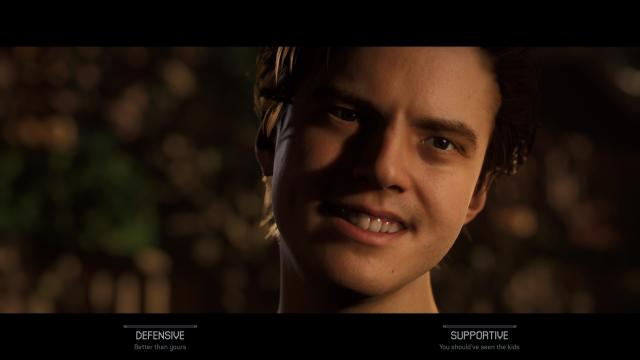
Another regression comes from the 'Don't Move!' segments. What was once a motion-control sensitive segment has been reduced to holding down a single button. Pretending to – then actually – getting a friend killed in Until Dawn is one of my most cherished memories of the game (it was the couch's fault), and knowing that it's mathematically impossible to do so again saddens me. These also come with an advisory, which I agree with in this instance, but it shouldn't be nearly as lethargic as it is. The heart-beat 'rhythm game' refinement of this idea in The Dark Pictures Anthology would have been a better fit, but even that's too basic to test your reflexes in any meaningful way.
Even stranger is the fact that, despite taking place around a summer camp (a much larger surface area than Until Dawn), there's somehow less to 'explore', resulting in a more gated experience than it should be. The Quarry has at least four major locations, yet you don't get to know any of them intimately. None have the impact of the Washington Lodge or Blackwood Sanitorium. I couldn't wait to get to 'The Island', and once I got there it felt no different than the camp. Hackett Manor (which should have played like a haunted house) and the junkyard are just as condensed, having little distinction from one another. The locations are massive, but in the end there isn't anywhere for the player to go.
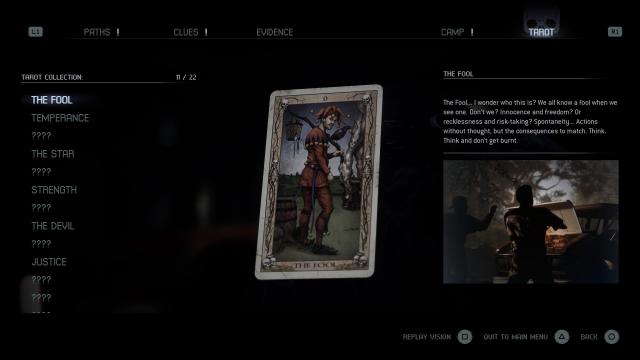
Compounding this further is the lack of gravitas that comes from discovering things in the environment. Clues and pieces of evidence existed within Until Dawn that potentially exposed the game's plot long before the story unfolded. There, an astute observer was rewarded and encouraged to look around every corner. In The Quarry, almost everything that can be found comes off as busy work or is less tangibly connected to the narrative. As opposed to gleaning insight from a newspaper clipping which would make you connect-the-dots, now you read a two-sentence summary of what the article said that has little context or makes no impact until long after events unfold.
What bothers me most about The Quarry is its unabashed, eclectic imitation of the past. Now I'm hip with the occasional Evil Dead camera-angle or Savini's brand of beer (a reference to horror icon Tom Savini), but it goes too far. There's a difference between a 'nod', an 'homage', and 'shameless plagiarization of what came before just because it worked the last time'.
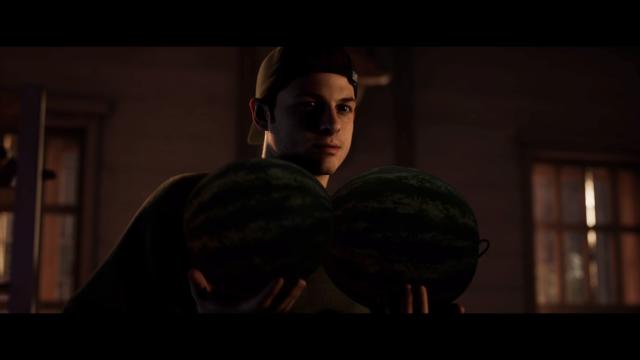
I get that there are classic horror conventions to follow as a standard (the final girl, extrovert jock, tokenism, etc.), but practically the entire main cast of The Quarry has a direct analogue from Until Dawn: Nick and Abbi's awkward, aspiring romance is an exact mirror of Chris and Ashley's relationship; Kaitlyn's pragmatic, feet on the ground persona comes directly from Emily; Emma could be swapped with Jessica and nobody would notice; Jacob was 'inspired' by Mike (both even have encounters with bear traps); and Laura came from Claire. Even my favorite, Ryan, has patterns of Josh's off-putting, uneasy performance. That leaves Max and Dylan as the only new additions to the cast, which might be why their characters come off as so deliberate.
For example, Chapter 7 is an exposition-heavy flashback over an hour in length. Pacing issues aside, it quickly becomes evident that the sole reason this portion of the game exists is to attempt to distance the narrative from Until Dawn. Unfortunately, once this is revealed, it's understood that the prologue – alongside Laura, Max, and Travis – could be feasibly removed from the story entirely with little consequence (while tightening it up considerably). The only problem is that once you do that, what you're left with is Until Dawn. Again, this isn't necessarily bad (the Laura/Travis dynamic is one of the best parts of the game), but it's not demonstrative of seven years of progress either.
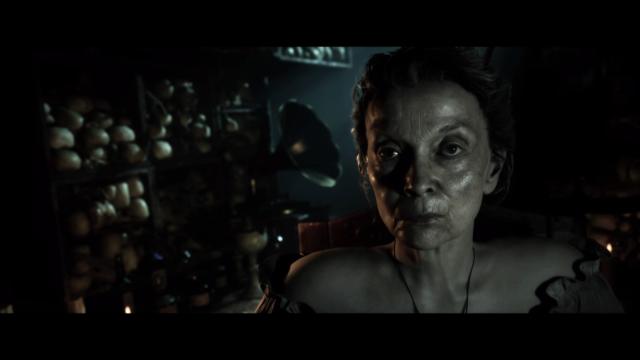
Another is Eliza the Fortune Teller. As much as I love Grace Zabriskie (who was great in Twin Peaks and Seinfeld), the whole omniscient narrator motif is beyond tired. Although she's integrated into the story better than The Analyst or The Curator, this doesn't negate the fact that it's the third incarnation of an idea that's been in five games in under seven years. I enjoyed it initially, but if I run across 'The Counselor' down the road, I'll be convinced that Supermassive actively seeks to stay in its rut.
The most perplexing of The Quarry's imitative qualities comes from its tutorials. Narrated by a Rod Serling impersonator, these 'lessons' are completely unneeded and don't fit the game's tone in any tangible way. Man of Medan and Little Hope were exponentially more evocative of The Twilight Zone. If that wasn't annoying enough, their animated aesthetic is lifted entirely from Fallout 4's S.P.E.C.I.A.L. training films. There's no originality to be found; it legitimately reads as if the direction was: “Make tutorials like Fallout and use The Twilight Zone guy for the voice-over”. Why though? Since when has pressing 'up' required a 47-second explanation?
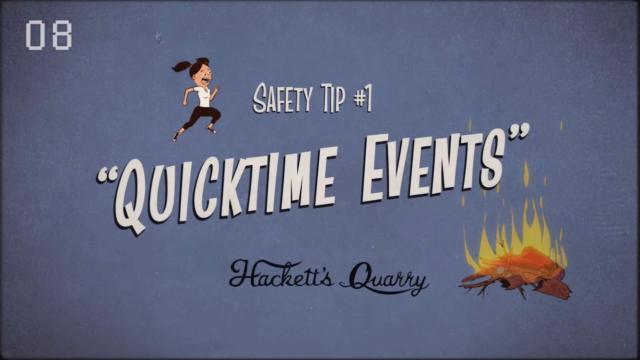
One of the two new features The Quarry brings to the table is 'Death Rewind'. Unlocked after the initial playthrough, Death Rewind functions exactly as advertised: should a protagonist buy the farm, their destiny can be reversed (up to three times) back to the moment you chose their fate. For certain characters, this could be going back to the most recent choice made. In one instance, it means reverting from Chapter 10 to Chapter 1 – essentially restarting the entire game. With nine protagonists (and seven antagonists) to keep track of, I understand the want to include a system like this, but it's a cheap adhesive covering a greater wound. If Supermassive requires this many characters, limiting the player to two or three choices each session and branching off from there is a far better way of going about it (and would encourage subsequent runs). This would also improve the multiplayer, which doesn't work nearly as well in The Quarry as it does in The Dark Pictures Anthology. As it stands, Death Rewind goes against the entire 'choice and consequence' philosophy Supermassive has fostered in its fanbase for seven years. It's the very antitheses of what put the studio on the map.
The second is 'Movie Mode'. Featuring four different 'edits' of The Quarry, Movie Mode removes every exploratory section in lieu of the game making the choices itself, essentially playing out in one uninterrupted viewing. The irony of praising a game for removing its gameplay isn't lost on me (especially after what I said earlier concerning modern cinema), but with so much agency having already been removed, this actually plays into The Quarry's strengths while simultaneously sidestepping its weaknesses.
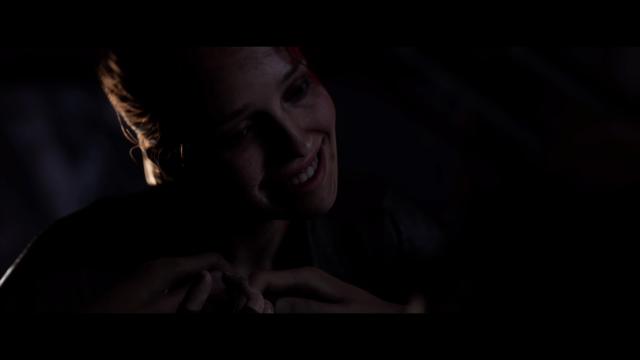
'Director's Chair' allows the player to imbue the counselors with three types of qualities across four categories. Should you want to go against type and make Kaitlyn clumsy and oblivious, or turn Jacob into the vigilant voice of reason, the power is yours. The three remaining modes are self-explanatory: 'Everyone Lives', 'Everyone Dies', and (most disturbing of all) 'Gorefest', where everyone dies – but in the most horrible ways possible. So, if you're the kind of person who roots for the chainsaw and hockey mask to prevail, you and Jeffery Dahmer can have something to watch when the Manson Family comes over for fava beans.
I was finally expecting the Until Dawn-killer with this one – and what I got is its over-privileged granddaughter who only has a piece of what made her ancestor so special. Don't get me wrong, I enjoy my sexy teenagers as much as the rest of the internet, but they work best when they're a starting point, not the destination. In a genre where choices and their ramifications make the difference between life or death, where's the game where you play as the overworked, underemployed hospital staff? What about a foo-fighter chasing airplane pilot from World War II? The potential here is virtually limitless, yet it's starting to be squandered, as are the longtime fans, who I have to imagine are hungry for something different by now. I'd like to tell you that The Quarry is Supermassive's best work yet, but it's not as good as it should be. If I didn't genuinely believe that fanbases ultimately ruin what brings them together in the first place (FromSoftware), I'd be more upset. I'll wait for The Devil in Me before drawing conclusions, but I'm beginning to miss the chances that games like Hidden Agenda or The Inpatient took; they may not have been big steps forward, but at least they were heading in the right direction.
An old hat is comfortable to wear, but quick to remind you where it came from.









